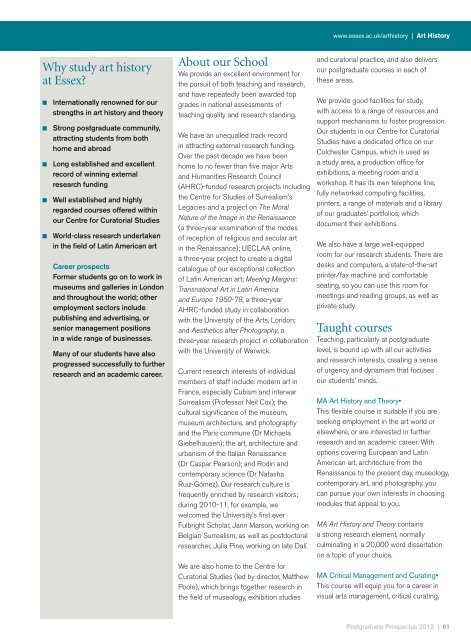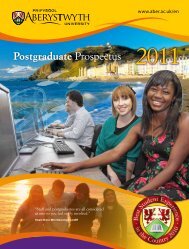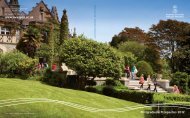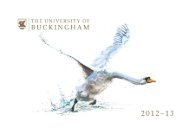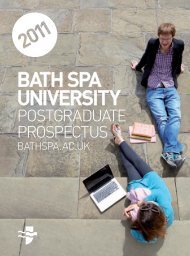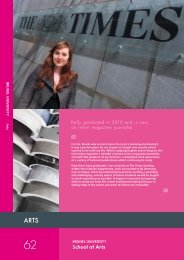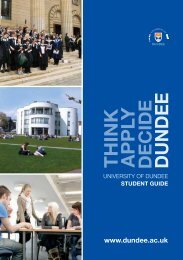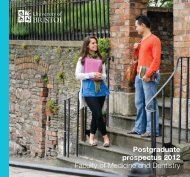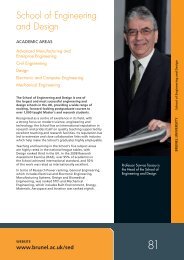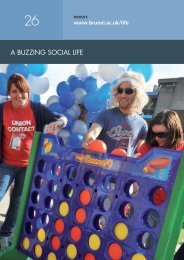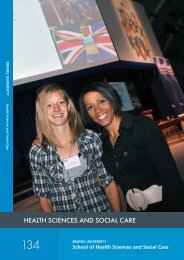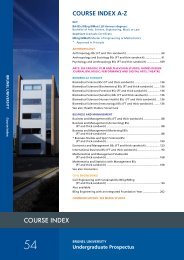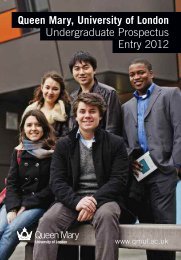Postgraduate Prospectus
Postgraduate Prospectus
Postgraduate Prospectus
You also want an ePaper? Increase the reach of your titles
YUMPU automatically turns print PDFs into web optimized ePapers that Google loves.
www.essex.ac.uk/arthistory | Art History<br />
Why study art history<br />
at Essex?<br />
n<br />
n<br />
n<br />
n<br />
n<br />
Internationally renowned for our<br />
strengths in art history and theory<br />
Strong postgraduate community,<br />
attracting students from both<br />
home and abroad<br />
Long established and excellent<br />
record of winning external<br />
research funding<br />
Well established and highly<br />
regarded courses offered within<br />
our Centre for Curatorial Studies<br />
World-class research undertaken<br />
in the field of Latin American art<br />
Career prospects<br />
Former students go on to work in<br />
museums and galleries in London<br />
and throughout the world; other<br />
employment sectors include<br />
publishing and advertising, or<br />
senior management positions<br />
in a wide range of businesses.<br />
Many of our students have also<br />
progressed successfully to further<br />
research and an academic career.<br />
About our School<br />
We provide an excellent environment for<br />
the pursuit of both teaching and research,<br />
and have repeatedly been awarded top<br />
grades in national assessments of<br />
teaching quality and research standing.<br />
We have an unequalled track record<br />
in attracting external research funding.<br />
Over the past decade we have been<br />
home to no fewer than five major Arts<br />
and Humanities Research Council<br />
(AHRC)-funded research projects including<br />
the Centre for Studies of Surrealism’s<br />
Legacies and a project on The Moral<br />
Nature of the Image in the Renaissance<br />
(a three-year examination of the modes<br />
of reception of religious and secular art<br />
in the Renaissance); UECLAA online,<br />
a three-year project to create a digital<br />
catalogue of our exceptional collection<br />
of Latin American art; Meeting Margins:<br />
Transnational Art in Latin America<br />
and Europe 1950-78, a three-year<br />
AHRC-funded study in collaboration<br />
with the University of the Arts, London;<br />
and Aesthetics after Photography, a<br />
three-year research project in collaboration<br />
with the University of Warwick.<br />
Current research interests of individual<br />
members of staff include: modern art in<br />
France, especially Cubism and interwar<br />
Surrealism (Professor Neil Cox); the<br />
cultural significance of the museum,<br />
museum architecture, and photography<br />
and the Paris commune (Dr Michaela<br />
Giebelhausen); the art, architecture and<br />
urbanism of the Italian Renaissance<br />
(Dr Caspar Pearson); and Rodin and<br />
contemporary science (Dr Natasha<br />
Ruiz-Gómez). Our research culture is<br />
frequently enriched by research visitors;<br />
during 2010-11, for example, we<br />
welcomed the University’s first ever<br />
Fulbright Scholar, Jann Marson, working on<br />
Belgian Surrealism, as well as postdoctoral<br />
researcher, Julia Pine, working on late Dalí.<br />
We are also home to the Centre for<br />
Curatorial Studies (led by director, Matthew<br />
Poole), which brings together research in<br />
the field of museology, exhibition studies<br />
and curatorial practice, and also delivers<br />
our postgraduate courses in each of<br />
these areas.<br />
We provide good facilities for study,<br />
with access to a range of resources and<br />
support mechanisms to foster progression.<br />
Our students in our Centre for Curatorial<br />
Studies have a dedicated office on our<br />
Colchester Campus, which is used as<br />
a study area, a production office for<br />
exhibitions, a meeting room and a<br />
workshop. It has its own telephone line,<br />
fully networked computing facilities,<br />
printers, a range of materials and a library<br />
of our graduates’ portfolios, which<br />
document their exhibitions.<br />
We also have a large well-equipped<br />
room for our research students. There are<br />
desks and computers, a state-of-the-art<br />
printer/fax machine and comfortable<br />
seating, so you can use this room for<br />
meetings and reading groups, as well as<br />
private study.<br />
Taught courses<br />
Teaching, particularly at postgraduate<br />
level, is bound up with all our activities<br />
and research interests, creating a sense<br />
of urgency and dynamism that focuses<br />
our students' minds.<br />
MA Art History and Theory•<br />
This flexible course is suitable if you are<br />
seeking employment in the art world or<br />
elsewhere, or are interested in further<br />
research and an academic career. With<br />
options covering European and Latin<br />
American art, architecture from the<br />
Renaissance to the present day, museology,<br />
contemporary art, and photography, you<br />
can pursue your own interests in choosing<br />
modules that appeal to you.<br />
MA Art History and Theory contains<br />
a strong research element, normally<br />
culminating in a 20,000 word dissertation<br />
on a topic of your choice.<br />
MA Critical Management and Curating•<br />
This course will equip you for a career in<br />
visual arts management, critical curating,<br />
<strong>Postgraduate</strong> <strong>Prospectus</strong> 2012 | 61


